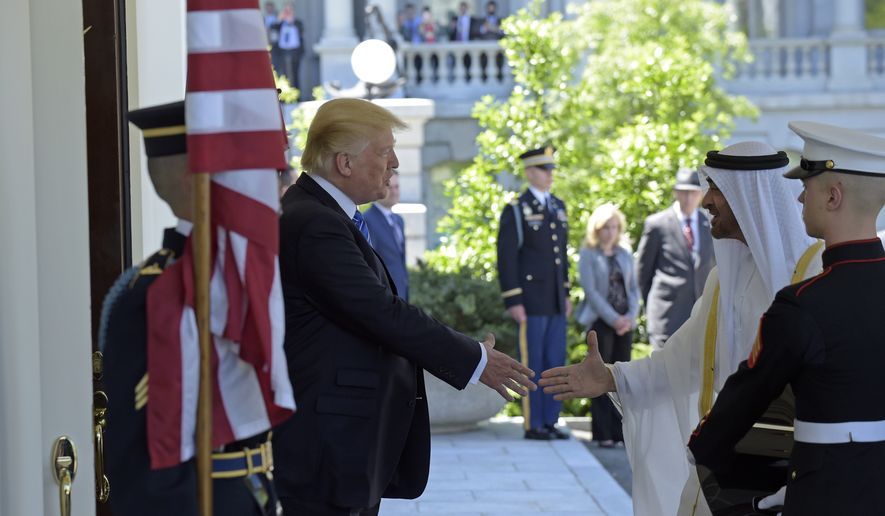President Trump met Monday with the leader of the United Arab Emirates, laying groundwork for his first foreign trip and a summit with Muslim leaders in Saudi Arabia that is vital to his plan to confront radical Islamic terrorism.
The get-together with Abu Dhabi Crown Prince Sheikh Mohammed bin Zayed Al Nahyan gave Mr. Trump an opportunity to build on a personal relationship and the longtime alliance between the two countries.
Mr. Trump will need all the insider support he can muster next week when he seeks to persuade Muslim countries to take on a larger role in combating the Islamic State and the influence of Iran, including cracking down on funding streams to radical Islamic groups that Muslim leaders often ignore.
As he welcomed Sheikh Mohammed into the Oval Office, Mr. Trump told reporters it was a “great honor” and gave a nod to their long relationship.
“He is special. I respect him, and I’ve known him for a long time,” said Mr. Trump.
He said the sheikh “loves his country. I can tell you that, loves his country. And I think [he] loves the United States, which to us is very important.”
Still, the topics up for discussion were difficult, including the civil war in Syria, the spread of radical Islam, the growing influence of Iran and the quest for Middle East peace.
Those same topics will dominate the summit in Saudi Arabia, which will be the first stop on the trip set to begin Friday. Mr. Trump set the itinerary to show that he is not a foe of the Muslim world and underscore the urgent need for stronger partnerships across the Middle East.
Mr. Trump has prodded Muslim countries to shoulder more of the burden of combating the Islamic State and other issues in the region. However, he also has adopted a more muscular stance in the Middle East than the Obama administration, which could prove a disincentive for Muslim leaders to get more involved.
Mr. Trump also will travel to Israel and Vatican City in Rome in a historic journey organized by the president to bring together three prominent world religions.
“No president has ever visited the homelands and the holy sites of the Jewish, Christian and Muslim faiths all on one trip,” National Security Advisor Lt. Gen. H.R. McMaster said last week.
Mr. Trump then will attend a NATO leaders summit in Brussels and a G7 meeting in Sicily.
Mr. Trump isn’t the first U.S. president to seek more cooperation from leaders in the Muslim world, and he needs to avoid the pitfalls that hobbled past efforts, said John Glaser, associate director of foreign policy studies at the Cato Institute, a libertarian think tank in Washington.
“The Gulf states have tended to use the United States’ power in the region to serve their own selfish national interests,” Mr. Glaser said. “This comes in the form of pressuring Washington to tackle local problems that are more of a direct threat to them than to the United States itself. It also comes in the form of hyping the threat of Iran, and thus procuring lucrative U.S. arms sales for their own defense.”
The funding of radical groups, an issue the White House highlighted in announcing the trip, has befuddled all of Mr. Trump’s predecessors.
“Many of the Arab Gulf states have played a bit of a double game with past U.S. administrations by talking a big game on their anti-terrorism efforts, while simultaneously looking the other way as domestic religious groups send money to and provide propaganda for extreme Sunni jihadi groups like al Qaeda, Jabhat al-Nusra and ISIS. Trump should try not to be fooled by this,” said Mr. Glaser.
In another primer for the trip, Mr. Trump will meet Wednesday with Turkish President Recep Tayyip Erdogan at the White House.
The meeting could prove tense, with U.S. and Turkey, a NATO ally, at odds over the conflict in Syria. The U.S. has been arming Kurdish fighters in Syria that are linked to Kurdish separatists in Turkey. The United States, the European Union and Turkey have labeled the separatists, known as the PKK, as a terrorist organization.
The Kurdish fighters, however, are key to U.S. strategy against the Islamic State, also know as ISIS and ISIL.
Mr. Trump’s deal-making skills will be put to the test.
“I see this trip as a new milestone in Turkey-U.S. relations,” Mr. Erdogan said as he embarked for Washington.
• S.A. Miller can be reached at smiller@washingtontimes.com.




Please read our comment policy before commenting.